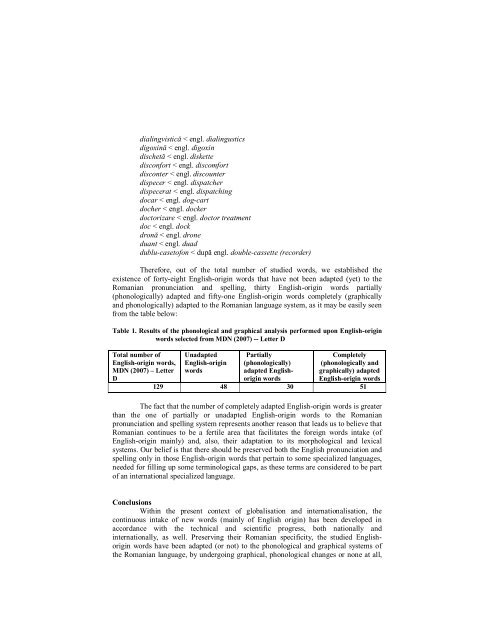language and literature european landmarks of identity
language and literature european landmarks of identity
language and literature european landmarks of identity
You also want an ePaper? Increase the reach of your titles
YUMPU automatically turns print PDFs into web optimized ePapers that Google loves.
dialingvistică < engl. dialingustics<br />
digoxină < engl. digoxin<br />
dischetă < engl. diskette<br />
disconfort < engl. discomfort<br />
disconter < engl. discounter<br />
dispecer < engl. dispatcher<br />
dispecerat < engl. dispatching<br />
docar < engl. dog-cart<br />
docher < engl. docker<br />
doctorizare < engl. doctor treatment<br />
doc < engl. dock<br />
dronă < engl. drone<br />
duant < engl. duad<br />
dublu-caset<strong>of</strong>on < după engl. double-cassette (recorder)<br />
Therefore, out <strong>of</strong> the total number <strong>of</strong> studied words, we established the<br />
existence <strong>of</strong> forty-eight English-origin words that have not been adapted (yet) to the<br />
Romanian pronunciation <strong>and</strong> spelling, thirty English-origin words partially<br />
(phonologically) adapted <strong>and</strong> fifty-one English-origin words completely (graphically<br />
<strong>and</strong> phonologically) adapted to the Romanian <strong>language</strong> system, as it may be easily seen<br />
from the table below:<br />
Table 1. Results <strong>of</strong> the phonological <strong>and</strong> graphical analysis performed upon English-origin<br />
words selected from MDN (2007) -- Letter D<br />
Total number <strong>of</strong><br />
English-origin words,<br />
MDN (2007) – Letter<br />
D<br />
Unadapted<br />
English-origin<br />
words<br />
Partially<br />
(phonologically)<br />
adapted Englishorigin<br />
words<br />
Completely<br />
(phonologically <strong>and</strong><br />
graphically) adapted<br />
English-origin words<br />
129 48 30 51<br />
The fact that the number <strong>of</strong> completely adapted English-origin words is greater<br />
than the one <strong>of</strong> partially or unadapted English-origin words to the Romanian<br />
pronunciation <strong>and</strong> spelling system represents another reason that leads us to believe that<br />
Romanian continues to be a fertile area that facilitates the foreign words intake (<strong>of</strong><br />
English-origin mainly) <strong>and</strong>, also, their adaptation to its morphological <strong>and</strong> lexical<br />
systems. Our belief is that there should be preserved both the English pronunciation <strong>and</strong><br />
spelling only in those English-origin words that pertain to some specialized <strong>language</strong>s,<br />
needed for filling up some terminological gaps, as these terms are considered to be part<br />
<strong>of</strong> an international specialized <strong>language</strong>.<br />
Conclusions<br />
Within the present context <strong>of</strong> globalisation <strong>and</strong> internationalisation, the<br />
continuous intake <strong>of</strong> new words (mainly <strong>of</strong> English origin) has been developed in<br />
accordance with the technical <strong>and</strong> scientific progress, both nationally <strong>and</strong><br />
internationally, as well. Preserving their Romanian specificity, the studied Englishorigin<br />
words have been adapted (or not) to the phonological <strong>and</strong> graphical systems <strong>of</strong><br />
the Romanian <strong>language</strong>, by undergoing graphical, phonological changes or none at all,


